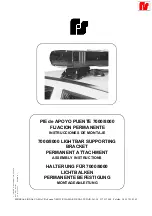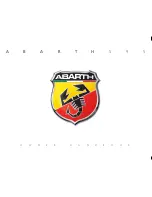
Supplemental Inflatable Restraint (SIR) System Service Precautions
WARNING
Work on these (SIR) systems should be performed by qualified service technicians.
WARNING
When performing service on or near the SIR components or the SIR wiring, you must
disable the SIR system. Refer to Disarming & Arming for the disable/enable procedure.
Failure to follow the correct procedure could cause air bag deployment, personal injury, or
unnecessary SIR system repairs.
WARNING
Safety precautions must be followed when handling a deployed inflator module (air bag).
After deployment, the inflator module (air bag) surface may contain a small amount of
sodium hydroxide, a by-product of deployment that is irritating to the skin and eyes.
Most of the powder on the inflator module (air bag) is harmless. As a precaution,
wear gloves and safety glasses when handling a deployed inflator module (air
bag), and wash your hands with mild soap and water afterwards.
When carrying a live inflator module (air bag), make sure the bag and trim cover
are pointed away from you. Never carry inflator module (air bag) by the wires or
connector on the underside of the module. In case of an accidental deployment,
the bag will deploy with minimal chance of injury. When placing a live inflator
module (air bag) on a bench or other surface, always face bag and trim cover up,
away from the surface.
Never rest a steering column assembly on the steering wheel with the inflator
module (air bag) face down and column vertical. This is necessary so that a free
space is provided to allow the inflator module (air bag) to expand in the unlikely
event of accidental deployment. Otherwise, personal injury could result.
Cleanliness and Care, Shop Practice
It should be understood that proper cleaning and protection of machined surfaces
and friction areas is part of the repair procedure. This is considered standard shop
practice even if not specifically stated.
When any internal engine parts are serviced, care and cleanliness is important.
When components are removed for service, they should be marked, organized or
retained in a specific order for reassembly.
At the time of installation, components should be installed in the same location and
with the same mating surface as when removed.
An automobile engine is a combination of many machined, honed, polished and
lapped surfaces with tolerances that are measured in millimeters or thousandths of
an inch. These surfaces should be covered or protected to avoid component
damage.
A liberal coating of clean engine oil should be applied to friction areas during
assembly.
Proper lubrication will protect and lubricate friction surfaces during initial operation.
Summary of Contents for TrailBlazer
Page 1: ......
Page 26: ...Fig 3 Typical body and undervehicle maintenance locations Refer to chart for descriptions ...
Page 29: ......
Page 30: ......
Page 31: ......
Page 175: ...Spring free length check Valve spring squareness check ...
Page 192: ...Front of piston mark ...
Page 361: ...5 3L Engine Except Saab Underhood Fuse Block 2003 2005 Early Production ...
Page 469: ...Removing the outer band from the CV boot Removing the inner band from the CV boot ...
Page 470: ...Removing the CV boot from the joint housing Clean the CV joint housing prior to removing boot ...
Page 471: ...Removing the CV joint housing assembly Removing the CV joint ...
Page 472: ...Inspecting the CV joint housing Removing the CV joint outer snap ring ...
Page 473: ...Checking the CV joint snap ring for wear CV joint snap ring typical ...
Page 474: ...Removing the CV joint assembly Removing the CV joint inner snap ring ...
Page 475: ...Installing the CV joint assembly typical ...
Page 553: ...9 Torque the lug nuts to specification 10 Lower the vehicle ...
Page 556: ...Toe in Frame Misalignment Frame misalignment ...
Page 588: ...Bleeding caliper ...
Page 624: ...Manifold gauge set components Refrigerant recovery recycling station ...
Page 676: ...A C Specifications ...
Page 677: ......
















































